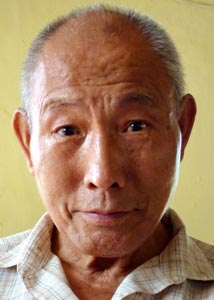Name: Lhundup
(Alias: No)
Gender: Male
Interview Age: 71
Date of Birth: 1939
Birthplace: Shidong Zong, Kham, Tibet
Year Left Tibet: 1959
Profession: Transportation
Monk/Nun: Previously
Political Prisoner: No

Interview No.: 12M
Date: 2010-04-05
Language: Tibetan
Location: Doeguling Settlement, Mundgod, Karnataka, India
Categories: Culture and History
Keywords: childhood memories, Chinese -- first appearance of, Chinese army -- invasion by , farm life, festivals, houses/villages, Kham, thamzing/struggle sessions, trade
Summary:
Lhundup was the oldest of his parents' six children. Besides farming a plot of fertile land and rearing a small number of animals, Lhundup's father engaged in trading salt. He recalls that his father's almost ruined his family by drinking and gambling away their property. His mother had to work very hard to sustain the family and also pay off the debts incurred by his father.
Lhundup provides a vivid description of his family's three-storied house, explaining the purposes of each room and type of construction. He also talks about religious festivals which were celebrated in the village at the local monastery. Traders passing through the village began spreading news of their trips to China, where they witnessed thamzing 'struggle sessions' during which Chinese people were shot and dumped in a large pit.
Later Tibetans fleeing from the thanzing occurring in the Kham region came to Lhundup's district and many local men joined the resistance movement to fight against Chinese occupation. Lhundup left his village in 1957 to escort his brother, a monk, to Drepung Monastery near Lhasa. At the advice of a friend he became a muleteer and traveled to India, transporting goods such as wool, flour, sugar and gasoline between Kalimpong [West Bengal, India] and Phari [Tibet]. In March 1959, after one of his trips to India, he could not return to Tibet.
Interview Team:
- Marcella Adamski (Interviewer)
- Tenzin Yangchen (Interpreter)
- Pema Tashi (Videographer)

